

Higher-Ed Reform or Drinking Game? You Decide. "Because each course in General Studies has been approved to meet specific learning outcomes associated with the General Studies curriculum, the course student learning outcomes listed on the syllabus must include learning outcomes that align with the identified General Studies learning outcomes and include assignments that will serve as embedded assessments for these learning outcomes.
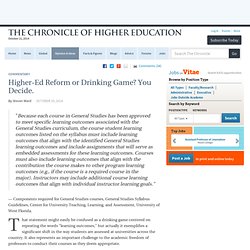
Courses must also include learning outcomes that align with the contribution the course makes to other program learning outcomes (e.g., if the course is a required course in the major). Instructors may include additional course learning outcomes that align with individual instructor learning goals. " — Components required for General Studies courses, General Studies Syllabus Guidelines, Center for University Teaching, Learning, and Assessment, University of West Florida.
Assessing student performance has always been at the heart of the academic enterprise. Local campus one of three to pilot Purdue initiative - South Bend Tribune: Local. SOUTH BEND -- Kirt Geslak scoops the tiny hot white polystyrene beads with a kitchen strainer, pouring them carefully into a metal mold.
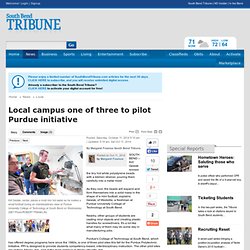
As they cool, the beads will expand and form themselves into a solid mass in the shape of a mini football, explains Geslak, of Westville, a freshman at Purdue University College of Technology at South Bend. An online service is needed to view this article in its entirety. You need an online service to view this article in its entirety. Login Or, use your facebook account: Federal regulators debate how to handle direct assessment programs. A federal audit has renewed confusion about whether the U.S.
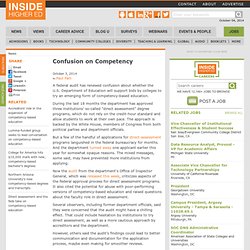
Department of Education will support bids by colleges to try an emerging form of competency-based education. During the last 18 months the department has approved three institutions’ so-called "direct assessment" degree programs, which do not rely on the credit-hour standard and allow students to work at their own pace. College for America spins off its custom-made learning management system. Southern New Hampshire University, seeing an opening in the market for a learning management system designed around competency-based education, is spinning off the custom-made system it built to support College for America.
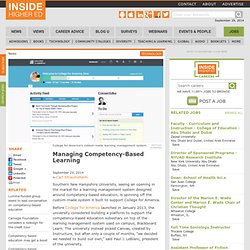
Before College for America launched in January 2013, the university considered building a platform to support the competency-based education subsidiary on top of the learning management system used on campus, Blackboard Learn. The university instead picked Canvas, created by Instructure, but after only a couple of months, “we decided we needed to build our own,” said Paul J. LeBlanc, president of the university. For most colleges and universities, any one of the major learning management systems on the market will likely meet their requirements for posting course content and engaging with students outside the classroom. For students, the system looks more like a social network than a learning management system.
Did State of the Union create opening for competency-based programs and other innovations? WASHINGTON -- In President Obama’s few sentences about higher education in the State of the Union address Tuesday night, there might have been a presidential precedent set: the first allusion to postsecondary accreditation in the landmark annual address to Congress.
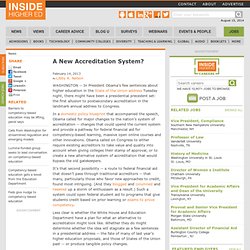
In a domestic policy blueprint that accompanied the speech, Obama called for major changes to the nation’s system of accreditation -- changes that could upend the current system and provide a pathway for federal financial aid for competency-based learning, massive open online courses and other innovations. Obama called on Congress to either require existing accreditors to take value and quality into account when giving colleges their stamp of approval, or to create a new alternative system of accreditation that would bypass the old gatekeepers.
Lumina-funded group seeks to lead conversation on competency-based education. Competency-based education appears to be higher education’s "next big thing.
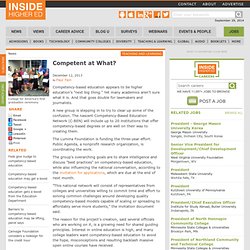
" Yet many academics aren’t sure what it is. And that goes double for lawmakers and journalists. College for America: A Milestone for Competency-Based Higher Ed. SUNY and the Expansion of Prior Learning Assessments. Last week Steve Kolowich wrote in the Chronicle of Higher Education about the State University of New York (SUNY) system approval of a plan that would target reduced time-to-degree.
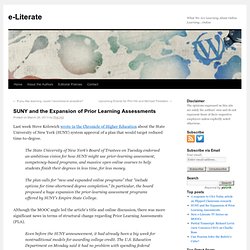
The State University of New York’s Board of Trustees on Tuesday endorsed an ambitious vision for how SUNY might use prior-learning assessment, competency-based programs, and massive open online courses to help students finish their degrees in less time, for less money.The plan calls for “new and expanded online programs” that “include options for time-shortened degree completion.” In particular, the board proposed a huge expansion the prior-learning assessment programs offered by SUNY’s Empire State College. Although the MOOC angle led the article’s title and online discussion, there was more significant news in terms of structural change regarding Prior Learning Assessments (PLA). Even before the SUNY announcement, it had already been a big week for nontraditional models for awarding college credit.
The U.S. ACE doubles down on prior learning assessment. WASHINGTON – If higher education has a group of quintessential insiders, it’s probably the American Council on Education.

Yet from a perch atop the higher education lobby’s headquarters here, the membership association of 1,800 college presidents is backing high-profile “disruptions” to the industry it represents. The council says it wants more students to earn college credit for learning that occurs outside the college classroom. Some of these credit pathways are trendy and new; others have been around for decades.
But interest in prior learning assessment has grown rapidly, particularly during the last six months, and ACE is riding the wave. ACE's leaders say they are giving a boost to alternative credit pathways because of the college “completion agenda,” work force development and money worries that are buffeting colleges. “We are experiencing a confluence of forces of change," Molly Broad, the council’s president, recently told the University of Wisconsin System’s Board of Regents.
Humanities students need to apply their knowledge, too. Why are programs with names like “Team builders” only for business students?
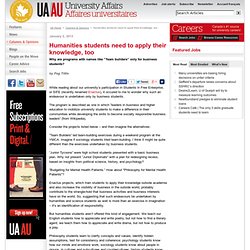
By Peg Tittle While reading about our university’s participation in Students in Free Enterprise, or SIFE (recently renamed Enactus), it occured to me to wonder why such an endeavour is undertaken only by business students. College Degrees Employers Want Most. A ‘Disruptive’ Look at Competency-Based Education. The University of Wisconsin Flexible Option. Facilitating Student Success through the Acceptance of Credit in Transfer. Facilitating Student Success through the Acceptance of Credit in Transfer By accepting credit and work done at prior institutions and through other learning providers, higher education institutions can take a big step toward making colleges and universities work for today’s adult student.
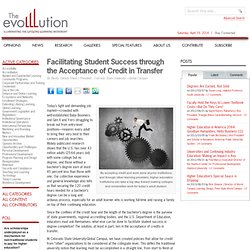
Today’s tight and demanding job market—crowded with well-established Baby Boomers and Gen X and Y-ers struggling to break out from entry-level positions—requires every adult to bring their very best to their careers and job searches. Widely publicized research shows that the U.S. has over 43 million adults (25-64 years old) with some college but no degree, and those without a bachelor’s degree earn at least 45 percent less than those with one. Since the confines of the credit hour and the length of the bachelor’s degree is the purview of state governments, regional accrediting bodies, and the U.S. Our Principles of Microeconomics and Accounting Basics courses are good examples. Why Companies Want Competency-Based Education. Why Companies Want Competency-Based Education Given the critical importance of employee competence in today’s workforce, competency-based models are becoming increasing important for employers, as this approach to higher education ensures that employees both understand the concepts being taught and can apply them in the work world.
Five major threats to a business have been identified by Express Employment Professionals. Through information shared with them by Gallup, Ernst & Young, The Aberdeen Group and others, Express Employment Professionals lists the following as the most pernicious problems that will cause a business to fail: The inability to innovateLosing competitive advantageThe high costs of reckless hiringPoor leadership and communicationRegulatory nightmares Of the five threats all but regulatory nightmares can be linked directly to employee competence or the lack thereof. Competency Model Clearinghouse - Industry Competency Models. Cracking the Credit Hour. Click here to download the report. The basic currency of higher education — the credit hour — represents the root of many problems plaguing America's higher education system: the practice of measuring time rather than learning.
Cracking the Credit Hour traces the history of this time-based unit, from the days of Andrew Carnegie to recent federal efforts to define a credit hour. Credit hours were never intended to measure learning (they came about largely because Andrew Carnegie wanted college professors to have pensions), but because they are easy to measure and understand, they have become the fundamental building blocks of higher education. Competency-Based Online Education: The Rising Tide of College Affordability. One of the interesting trends over the past year or two is the emergence of educational delivery models as a locus of innovation – with new business models, applications of technology, and tight integrations of educational content and delivery platforms.
In part 1 of this series, I described a new landscape of educational delivery models. In part 2 I described the master course concept that is the basis for most scalable for-profit and not-for-profit online programs. In part 3 and part 4 I described the emergence of MOOCs as well as four barriers they must overcome to become self-sustaining. In this post, I’d like to focus on the less glamorous, but perhaps more significant, movement in self-paced and competency-based online education.
Competency-based online program at Kentucky's community colleges. Sometimes potentially “disruptive” approaches to higher education arrive on campuses with little fanfare. And they can become solid additions to traditional colleges rather than an existential threat. Take Kentucky’s two-year college system, which three years ago began an online offering aimed at working adults. The project, dubbed “Learn on Demand,” hits most of the buzzwords du jour, featuring modular courses that lead to stackable credentials, with both self-paced and competency-based elements.
All that’s missing is a MOOC. But the program is up and running, with modest, but steadily increasing returns. Roughly 1,000 students are enrolled in Learn on Demand at any one time, according to officials at the Kentucky Community and Technical College System. On-campus students have also begun “plugging their schedules” with the courses, says Jay Box, the system’s chancellor.
“There was still an audience that we were missing, and that was working adults,” Box says. 'Conventional' online universities consider strategic response to MOOCs. Online education not only gave nontraditional students a chance to enroll in collegiate programs from afar; it has also given universities that historically have not enjoyed the prestige of the Ivies a chance to build a reputation on fresh territory and build reliable revenue streams. But, now that higher education’s traditional heavyweights are creating online courses and offering them for free to anyone who wants to register, those universities that have made names for themselves in the market for “conventional” online programs are trying to sort out how these high-profile “MOOCs” (i.e., Massive Open Online Courses) could affect their own positions in an online market where many have staked their futures. One strategy for established online players would put them in the somewhat ironic role of making sure students who have passed Harvard-level exams deserve college credit.
Manufacturing industry taps colleges for help with alternative credential. Potential “disruptions” to higher education typically portend a diminished role for the academy in workforce training, as students ditch college for, well, something else. But one of the most promising alternative credentialing movements – the manufacturing industry’s system of stackable certificates – has actually led to a deeper, more symbiotic relationship between employers and colleges. The growing partnership has also given rise to a blended model of higher education, where the manufacturing industry takes the lead on standards for competency-based education, with a helping hand from colleges, which then provide the traditional degree path.
For example, Harper College, a community college in Illinois, last month launched a program where students can earn industry-endorsed certificates in manufacturing. Northern Arizona U. partners with Pearson on competency-based degree programs. Colorado State to Offer Credits for Online Class. Accepting Credits for MOOCs: Good for Students, Good for Society. VuDAT (Virtual University Design & Technology) Student assessment is one of the key issues in education. Responding to Each Student’s Needs and Interests. Wisconsin seeks competency-based degree program without help of Western Governors. Should College Credit Be Awarded for Experience? Credentialing informal learning and experience is the next big push in higher education, with initiatives like Open Badges, Skills.to, Degreed, or LearningJar granting students credentials for skills and knowledge gained outside of school. A ‘Disruptive’ Look at Competency-Based Education. SOURCE: AP/ Jacquelyn Martin Burck Smith, CEO of StraighterLine, which offers low-cost college courses online and then partners with colleges and universities to accept its learners and give them credit for coursework toward a degree.
By Louis Soares | June 7, 2012. A New Methodology for Evaluation: The Pedagogical Rating of Online Courses. Online course offerings are increasing in numbers everyday. Connectivism and Connective Knowledge. Competency-based online program at Kentucky's community colleges. Sometimes potentially “disruptive” approaches to higher education arrive on campuses with little fanfare. And they can become solid additions to traditional colleges rather than an existential threat. Competency-based education may get a boost.